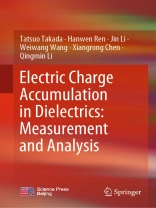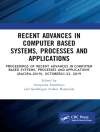This book mainly introduces how to measure and analyze electric charge accumulation in Dielectrics. By using the PEA and Q(t) methods with the Quantum Chemical Calculation, the charge characteristics of solid dielectrics under different situations are analyzed, which are never discussed in detail by other books. The book contains a large number of experimental and simulation data as illustrations, and thus the reader can understand the theory in the book very easily. Meanwhile, the reader can learn how to use the two methods to measure charge behavior under different conditions and analyze the charge phenomena by Quantum Chemical Calculation.
Table des matières
Classification of charge accumulation measurement.- Fundamentals of Q(t) measurement.- Evaluation of charge accumulation.- Q(t) data of various polymer materials.- Charge accumulation in inorganic materials.- Application to insulation diagnosis.- DC Insulation and space charge accumulation.- PEA method: pulsed electro-acoustic method.- Generation of pulse pressure wave.- Basics of electrodynamics and elastic mechanics.- Examples of PEA measurement results.- Basics of Quantum Chemical Calculation.- Application examples of Quantum Chemical Calculation.- Analysis examples by Quantum Chemical Calculation.
A propos de l’auteur
Tatsuo Takada was born in Yamanashi, Japan, in August 8th 1939. He received the B.E. degree in electrical engineering from Musashi Institute of Technology, Japan, in 1963 and the M.E. and Ph.D. degrees from Tohoku University, Japan in 1966 and 1975, respectively. He became a Lecturer, an Associate Professor and a Professor at Musashi Institute of Technology, in 1967, 1974 and 1987, respectively. He was a Visiting Scientist at MIT (USA) from 1981 to 1983 and he is a consulting professor of Xian Jiaotong University, China, 1995.
He has now undertaken several research projects on the development of acoustic and optical advanced methods for measuring electric charge distribution in dielectrics. For example, in order to investigate the space charge effect in solid dielectric material, the dynamic surface charge distribution on solid dielectric materials and the electric field vector distribution in liquid insulating materials. He received the progress award from the IEE of Japan in 1996. He has also received Whitehead Memorial Award in 1999 by his pioneering work on PEA, and gave an Award Lecture in IEEE CEIDP (Conference on Electrical Insulation and Dielectric Phenomena). He further received Chen Jidan Award for his contributed works in charge measurement and quantum chemical calculation and gave a plenary speech in IEEE ICEMPE (International Conference on Electrical Materials and Power Equipment). He is a Life Fellow member of IEEE. He can be reached by email at [email protected].
Hanwen Ren was born in Shanxi, China in 1994. He received his B.Sc. and Ph.D. degree in electrical engineering from North China Electric Power University, China in 2016 and 2021. Currently he is a lecturer and post-doctor in North China Electric Power University. He has published over 30 academic papers in journals and international conferences. Now he is mainly researching in the field of the space charge inside solid insulation and its measurement technology. He can be reached by email at [email protected].
Jin Li was born in Tangshan, China, in August 8th 1988. He received the B.S. and Ph.D. degree in Electrical Engineering from Tianjin University in 2012 and 2017. From 2017 to 2019, he worked as a post-doctor in Tianjin University with the support of National Postdoctoral Program for Innovative Talents. From October 2018 to January 2019, he was a visiting researcher in Measurement and Electric Machine Control Laboratory of Tokyo City University. Now he is an associate professor at the School of Electrical and Information Engineering, Tianjin University. His research interests are focused on the designing and improvement of solid dielectrics for HVDC power cable and gas-insulated transmission line.
He has authored or coauthored nearly 40 papers published on IEEE Transactions. He received IEEE ICEMPE Excellent Conference Paper, IEEE ASEMD Best Conference Paper and Outstanding Contributions to the Development of IEEE Standard 2780. He has also chaired several sessions in IEEE ICHVE, IEEE ICEMPE. He is the associate editor of IET High Voltage and membership of CIGRE NGN Group and CIGRE D1.73 Working Group. He can be reached by email at [email protected].
Weiwang Wang obtained his Ph.D. degrees in School of Electrical Engineering from Xi’an Jiaotong University (XJTU) China in 2015. From 2016 to 2018, he was a Lecturer of XJTU. Since 2019, He works as an associate professor in XJTU. From 2016 to 2017, he was a postdoc fellow in the Department of Mechanical System Engineering, Measurement and Electric Machine Control Laboratory in Tokyo City University, Japan. His research interests are dielectric materials, functionalized nanocomposites, space charge measurement and theory, power electronic transformer, multi-physics coupling simulation in power equipment. He has published over 35 academic papers injournals and international conferences, including the 15 SCI papers and 17 EI papers. He has also co-authored one book chapter in English. He has been awarded the 2018 Excellent Doctoral Dissertation in XJTU, and was selected as the Young Talent supported by Chinese Society of Electrical Engineering. As a program leader, he has engaged in over 10 projects, such as the NSFC project in China. He can be reached by email at [email protected].
Xiangrong Chen (Senior Member, IEEE) was born in Hunan, China, in 1982. He received the M.S. and Ph.D. degrees in electrical engineering from Xi’an Jiaotong University, Xi’an, China, in 2008 and 2011, respectively. He was a Postdoctor in 2011, Assistant Professor from 2012 to 2016, and Associate Professor in 2016 in high voltage engineering with the Department of Manufacturing and Materials Technology, Chalmers University of Technology, Gothenburg, Sweden. Since January 2017, he has been a One-Hundred Talents Researcher/Professor with the College of Electrical Engineering, Zhejiang University (ZJU), Hangzhou, China. His research interests include advanced electrical materials and high-voltage insulation testing technology, advanced power equipment and new power system, and advanced high-voltage technology. Dr. Chen has been an Associate Editor for the IEEE Transactions on Dielectrics and Electrical Insulation since May 2021, was the Vice-Dean of ZJU-UIUC Institute from 2020 to 2021, and has been the Head of the Institute of Power System Automation of ZJU since March 2020. He has published more than 110 papers with over 50 papers in IEEE Transactions, Composites Science and Technology and other well-recognized Journals. He can be reached by email at [email protected].
Qingmin Li received his B.Sc., M.Sc., and Ph.D. degrees in electrical engineering from Tsinghua University, China, in 1991, 1994, and 1999, respectively. He joined Tsinghua University as a lecturer in 1996, and came to the UK in 2000 as a postdoctoral research fellow at Liverpool University and later at Strathclyde University. From 2003 to 2011, he was with Shandong University, China, as a professor in electrical engineering. In 2010, he also joined Arizona State University, USA, as a visiting professor. He is currently a professor in electrical engineering at North China Electric Power University, China. His special fields of interest include solid dielectrics, GIS/GIL insulation, lightning protection of wind turbines, condition monitoring and fault diagnostics. He can be reached by email at [email protected].












